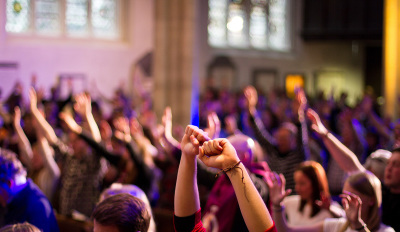If you want a pure church, your worship must also be pure

Though during this present age kingdom and cultus (God’s worshiping community) are separated, God intends one day to join them together under the rule of his Anointed One. The question for us is where we currently fit in this plan of God for a holy theocracy, a perfect union of kingdom and cultus under the kingly rule and priestly ministry of the Second Adam.
The book of Hebrews addresses both kingdom and cultus in this present age. First, the author quotes God’s declaration in Psalm 8 that he intends for man to exercise regal dominion over all the earth; however, “At present, we do not yet see everything in subjection to him” (Heb 2:8). The First Adam failed, and still all things are not yet in subjection to the son of man. But, “because of the suffering of death,” Jesus is “crowned with glory and honor” (Heb 2:9) — He has earned the right to rule; Christ is, as Psalm 110 states, presently seated at the Father’s right hand until the Father makes His enemies His footstool. The perfect eternal Kingdom has been promised and already ensured, but it is not yet a consummated reality. Christ sovereignly rules over all creation as the Son of God, and Christ presently rules over His redeemed people, but the consummation of His rule over all things on earth as the Son of Man will happen when He comes again, when “the kingdom of this world” — that is, the common grace kingdom — “will become the kingdom of our Lord and of His Christ” (Rev 11:15).
In other words, if we want to look to the Old Testament for an analogy to our present situation as Christians in this age, we are more like the sojourning patriarchs and the exiled Hebrews than either the Edenic or Mosaic holy theocracies. And, of course, this is exactly how the New Testament portrays us. Peter specifically calls us “sojourners and exiles” (1 Pet 2:11). “Our citizenship is in Heaven,” Paul tells us (Phil 3:20); we are “citizens with the saints and members of the household of God” (Eph 2:19). Like Abraham on his pilgrimage or Daniel in Babylon, Christians participate in the common grace aspects of the earthly kingdoms in which we dwell, but we “desire a better country, that is, a heavenly one” (Heb 11:16); we long for the heavenly Jerusalem above our highest joy (Ps 137:6). And that heavenly Jerusalem will one day descend to the earth, uniting kingdom and cultus as was God’s intention from the beginning.
Yet Hebrews also reveals to us the nature of our worship in this age as well. The author proclaims at the end of chapter 12,
"But you have come to Mount Zion and to the city of the living God, the heavenly Jerusalem, and to innumerable angels in festal gathering, and to the assembly of the firstborn who are enrolled in Heaven, and to God, the judge of all, and to the spirits of the righteous made perfect, and to Jesus, the mediator of a new covenant, and to the sprinkled blood that speaks a better word than the blood of Abel" (Heb 12:22–24)
This is the heavenly palace/temple Isaiah and John envisioned, the place where God himself sits enthroned, surrounded by heavenly beings.” To this higher kingdom where God reigns Christian worshipers come to the reality, to the true worship of heaven itself. Paul describes this reality for Christians in Ephesians 2:6 when he states that God has “raised us up with [Christ] and seated us with him in the heavenly places in Christ Jesus.” Christ is seated in heaven as the king/priest, and since we are in him by faith, we are with him there. And he tells us how just a few verses later in Ephesians 2:18: “For through [Christ] we ... have access in one Spirit to the Father.” We have access to the Father because in one Spirit through Christ, we are actually there, in the presence of God in Heaven.
Pure worship
This biblical understanding situates us in this present age as dual citizens. As members of the human race, we are citizens of common grace earthly kingdoms, and so we participate as such. But Ultimately we are a called-out cultic community with “an inheritance that is imperishable, undefiled, and unfading, kept in heaven for [us], who by God’s power are being guarded through faith for a salvation ready to be revealed in the last time” (1 Pet 1:4–5). Consequently, as Peter goes on to say, “as he who called you is holy, you also be holy in all your conduct ... Conduct yourselves with fear throughout the time of your exile, knowing that you were ransomed from the futile ways inherited from your forefathers” (1 Pet 1:15, 17–18).
In other words, though we are citizens of common grace kingdoms, our conduct ought to be set apart from that of unbelieving people because we are a set-apart cultic community. In 1 Peter 1, Peter addresses our holy conduct in the midst of the unbelieving people of the common kingdoms in which we find ourselves, and in chapter 2, Peter grounds the basis for that holy conduct in our present situation as a called-out cultic community. He says in 2:4, “As you come to him” — the phrase “come to him” has the same root as when Hebrews 12:22 says “you have come to Mount Zion.” This indicates the reality of drawing near to the presence of God in the heavenly temple as a cultic community through Christ in the Spirit. This is what Isaiah and John experienced as they entered the heavenly temple of God and saw him high and lifted up. To come to God is the essential characteristic of our situation as a called-out worshiping community.
And Peter makes this very clear with the picture he continues to build:
"As you come to him, a living stone rejected by men but in the sight of God chosen and precious, you yourselves like living stones are being built up as a spiritual house, to be a holy priesthood, to offer spiritual sacrifices acceptable to God through Jesus Christ" (1 Pet 2:4–5)
Peter uses the metaphor of a temple to describe the nature of who we are as the NT church — we are a spiritual house with Jesus Christ as our cornerstone. Again, this refers to the heavenly temple to which Hebrews 12 says we have come. But Peter extends the picture further. Not only are we a spiritual temple, but we are also a holy priesthood, a cultic community set apart from the rest of humanity. We are priests who “offer spiritual sacrifice acceptable to God through Jesus Christ.”
Peter continues to describe us this way in 2:9–10:
"But you are a chosen race, a royal priesthood, a holy nation, a people for his own possession, that you may proclaim the excellencies of him who called you out of darkness into his marvelous light. Once you were not a people, but now you are God’s people; once you had not received mercy, but now you have received mercy."
Peter is emphasizing our status as citizens of the higher kingdom — we are a called-out people for God’s own possession. Though we are still citizens of common grace kingdoms, we are nevertheless set apart from the other non-redeemed citizens of common kingdoms because we have received God’s mercy — we are God’s unique people, “sojourners and exiles” as Peter calls us once again in verse 11.
But what is critically important to recognize about the flow of Peter’s thought here is the connection he makes between our status as a called-out cultic community and our lives as citizens of common grace kingdoms. His focus in the first 10 verses of chapter 2 on our cultic reality fuels his discussion in the rest of the chapter regarding how we ought to live among the unbelieving people of the world. As he continues in verse 11,
"Beloved, I urge you as sojourners and exiles to abstain from the passions of the flesh, which wage war against your soul. 12 Keep your conduct among the Gentiles honorable, so that when they speak against you as evildoers, they may see your good deeds and glorify God on the day of visitation."
As a called-out cultic community with heavenly citizenship, we ought to live honorably among unbelievers, showing them through our lives and witness how they may join us. Peter had commanded believers in the previous chapter to be holy, to not be “conformed to the passions of your former ignorance” (1 Pet 1:14), and later in chapter 4 he will urge them to refrain from “doing what the Gentiles want to do” (1 Pet 4:3). Paul commands believers to “no longer walk as the Gentiles do” (Eph 4:16) and “be not conformed to this world” (Rom 12:2). The rest of Peter’s letter essentially fleshes out what it looks like for a member of the called out cultic community to live as a citizen in common grace kingdoms, including his role within government (2:13–17), vocation (2:18–25), and family (3:1–7), fully expecting that since we are a distinct people, we will have to suffer for righteousness’ sake (3:14).
How pure worship forms a pure church
This is the essential connection point between our identity as a called-out worshiping community and our active engagement in the common kingdoms of this world. Pure worship on earth in which we participate in the real worship of heaven forms a pure church, a called-out community that will live faithfully in the common kingdoms of the world. This is why our worship now ought to be regulated by Scripture and modeled after the theological pattern of true worship as foreshadowed in the rituals of OT worship and revealed in the biblical visions of heavenly worship. From creation to consummation, the corporate worship of God’s people is a memorial — a reenactment — of the “theo-logic” of true worship: God’s call for his people to commune with him through the sacrifice of atonement that he has provided, listening to his Word, responding with praise and obedience, and culminating with a beautiful picture of perfect communion with God in the form of a feast. This reenactment in a corporate worship service of God’s covenant work for us is what will progressively form into us the theologic of heavenly worship that will profoundly affect how we live in this present evil age.
Worship now that is shaped by the true spiritual realities of heavenly worship is what God has designed to sanctify us to live by faith in light of those realities, just like the saints of old. Worship in this life that is shaped by our covenant relationship with God through the gospel, the spiritual realities of heavenly worship, sanctifies us into a pure church that lives in light of that relationship as we wait for our blessed hope. By reenacting what we are in Christ, Christian worshipers become what we are.
We come now by faith and not by sight since we are not yet in the higher kingdom physically, but one day faith will be sight. Now, we gather around Christ’s table to remember the hope of glory, and we are with him spiritually, though we cannot see him with physical eyes. One day we will sit at his table in our glorified bodies, clothed in fine linen, bright and pure, and we will see Christ bodily with our physical eyes. And we will join our voices in that holy theocracy with “the voice of a great multitude, like the roar of many waters and like the sound of mighty peals of thunder, crying out, ‘Hallelujah! For the Lord our God the Almighty reigns. Let us rejoice and exult and give him the glory.’”
“Therefore let us be grateful for receiving a kingdom that cannot be shaken, and thus let us offer to God acceptable worship, with reverence and awe, for our God is a consuming fire” (12:27–29).
Originally published at G3 Ministries.
Scott Aniol, PhD, is Executive Vice President and Editor-in-Chief of G3 Ministries. In addition to his role with G3, Scott is Professor of Pastoral Theology at Grace Bible Theological Seminary in Conway, Arkansas. He lectures around the world in churches, conferences, colleges, and seminaries, and he has authored several books and dozens of articles. You can find more, including publications and speaking itinerary, at www.scottaniol.com. Scott and his wife, Becky, have four children: Caleb, Kate, Christopher, and Caroline. You can listen to his podcast here.



























